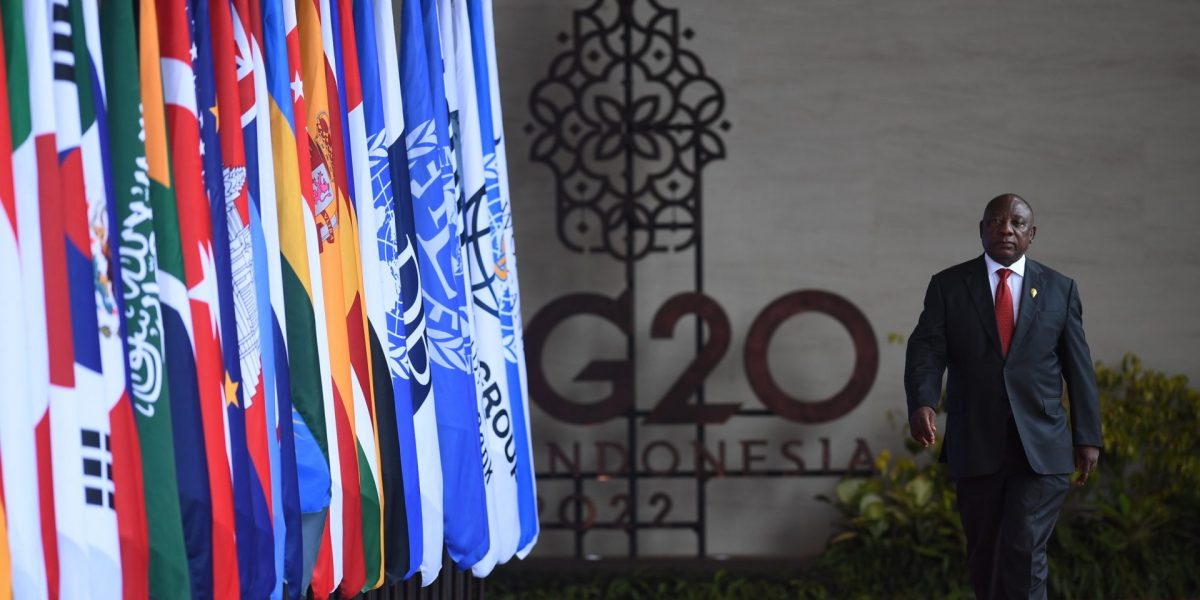The Group of Twenty (G20) is an intergovernmental economic forum comprising 19 countries and two regional unions – the EU and AU. It represent 85% of the global economy, 75% of world trade and 67% of the global population.
South Africa’s leadership of this group therefore presents a unique opportunity to shape global policies and advocate for Africa’s interests on the world stage. The G20 countries include Argentina, Australia, Brazil, Canada, China, France, Germany, India, Indonesia, Italy, Japan, Mexico, Russia, Saudi Arabia, South Africa, South Korea, Turkey, the UK and US as well as the EU and AU. Chrispin Phiri, spokesperson for the Minister of International Relations and Cooperation, says the theme for South Africa’s presidency will be ‘Fostering Solidarity, Equality and Sustainable Development’. It seeks to address critical global challenges with a strong focus on Africa’s development.
Among the key areas the presidency will focus on include addressing the triple challenges of poverty, unemployment and inequality as well as Africa’s development which entails placing Africa’s development at the forefront in alignment with the AU’s Agenda 2063, ‘The Africa We Want’. Also expected to form part of the South African priorities is tackling poly-crises such as climate change, energy, food security and debt that disproportionately affects Africa and other developing nations. Issues of infrastructure development and global governance reform initiated by previous G20 presidencies.
Phiri says South Africa’s foreign policy is deeply intertwined with its domestic priorities and aims to foster a better, stable and prosperous South Africa, Southern African Development Community (SADC) region and Africa. “South Africa’s presidency is poised to have significant implications for the broader African region, particularly within the SADC. The nation’s strategic position within the G20 will enable it to lobby for policy gains that benefit South Africa, the SADC, and the entire continent, in which key areas of focus include promoting policies that ensure economic benefits for all South Africans, particularly the economically marginalised, for economic benefits,” says Phiri.
Phiri highlighted the importance of South Africa’s coordination with the AU, particularly in leveraging the G20 presidency to advance regional integration and cooperation. As G20 president, South Africa will also focus on addressing global economic challenges and promoting sustainable development. The nation’s policy agenda will be informed by its National Development Plan, Agenda 2063 and long-standing issues within the G20 framework. Phiri said South Africa will advocate for reforming the global debt architecture to prevent debt crises from undermining the realisation of Sustainable Development Goals (SDGs) and also mobilise financing to address the substantial development financing gap, which has increased post-COVID 19 as well as address the issue of (Illegal Financial Flows) IFFs, which drain approximately $88.6 billion annually from the continent, impeding progress toward Agenda 2063 and SDG targets will be key.
Professor Danny Bradlow, a Senior Research Fellow at the Centre for Advancement of Scholarship at the University of Pretoria, says South Africa’s priorities should include addressing debt and development financing, particularly for Africa. Bradlow wants South Africa to co-chair the Global Sovereign Debt Roundtable alongside the IMF and the World Bank. The forum offers an opportunity to push for a more creative approach to managing debt, linking it to broader discussions on development and climate finance.
“This presidency provides an opportunity to address some longstanding bottlenecks facing regional integration in Africa. For instance, one of the key challenges faced by the African Continental Free Trade Area (AfCFTA) and Regional Economic Communities (RECs) are bilateral trade agreements that undermine Africa’s regional integration efforts,” says Bradlow. He urged South Africa to use the momentum of the AU admission and its G20 presidency to highlight these and push for commitments that support regional integration, in close coordination with the relevant AU organs and knowledge partners.
Bradlow notes the need for South Africa to inherit and advance initiatives from Brazil’s G20 presidency, such as the Hunger and Poverty Alliance and discussions on global taxation, particularly the contentious issue of a wealth tax on billionaires. He acknowledges that while these are complex issues involving questions of sovereignty they are crucial for generating resources for development finance.
On her part, the CEO of the South African Institute of International Affairs (SAIIA), Elizabeth Sidiropoulos, stressed the importance of enhancing regional cooperation and integration. “From a policy vantage point, South Africa’s G20 Presidency seeks to respond to global economic and environmental challenges and sustainable peace, bearing in mind efforts to achieve the SDGs, the AU’s Agenda 2063 as well as reforming institutions of global economic governance,” says Sidiropoulos. She pointed out that with the AU now being a member of the G20, there is a greater opportunity to amplify African priorities and suggested that South Africa should focus on deepening the continent’s advocacy within the G20, selecting key issues where it can make a significant impact. She recommended that South Africa use its presidency to address longstanding bottlenecks facing regional integration in Africa
South Africa’s presidency of the G20 in 2025 is a pivotal moment for the nation and the continent. With the AU’s recent inclusion in the G20, there is a historic opportunity to reshape global governance in a way that reflects the aspirations and challenges of the Global South. Bradlow says South Africa’s success will depend on its ability to balance immediate priorities with long-term global goals and ensuring that the G20 remains a platform for inclusive and equitable growth.
This article was first published on the United Nations Africa Renewal website.








